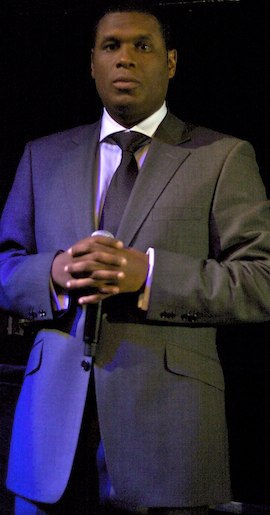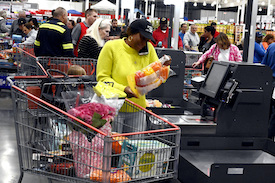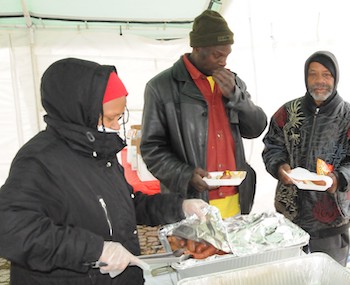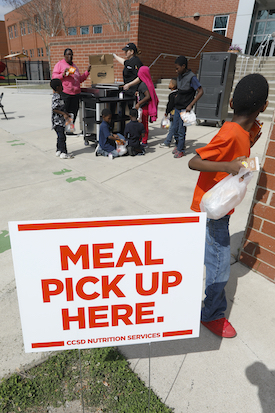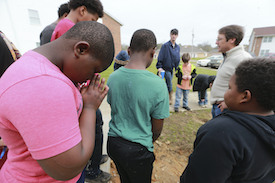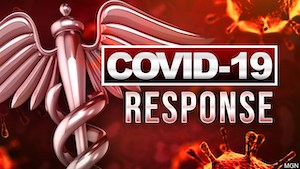Changing America’s way of life?
By Barrington M. Salmon Contributing Writer @bsalmondc
WASHINGTON—In recent weeks, Americans grappled with the inevitability of the coronavirus reaching this country. Public anxiety ratcheted up as the number of cases and fatalities grew, but there was a sense that it wouldn’t get as bad here as it had in China, South Korea and Italy.
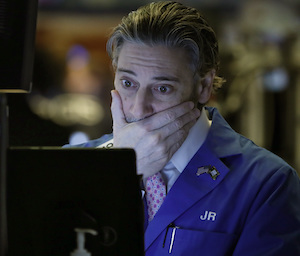
Trader John Romolo works on the floor of the New York Stock Ex- change, March 5. Stocks are opening sharply lower on Wall Street, erasing two percent from major indexes, a day after surging four percent as the mood swings back to fear about the effects of a fast- spreading virus. Photo: AP Photo/Richard Drew
Then, as if a light switch went on, jittery Americans watched the stock market, and their 401Ks and pensions, tumble to new record lows day-after-day; the World Health Organization declared COVID-19 an international pandemic; President Donald Trump and administration officials failed to reassure the public facing a major public health emergency.
The coronavirus has fundamentally altered the way Americans live, at least in the short-term. Major and minor league sports—college and professional basketball, baseball, soccer, golf and NASCAR—announced the shutdown of operations or suspension of play.
Then came public school and college closures, shutdowns of businesses, panicked buying and a president who continually lied about the crisis and seemed most concerned with the virus’ economic impact and impact on his possible reelection.
The Honorable Minister Louis Farrakhan, in a major address in Detroit to close the Nation of Islam’s Saviours’ Day convention, warned that America was facing dangerous times under an imperial president and was a nation facing divine judgment.
“As I was watching the impeachment trial of President Trump, I was looking at America, not at her finest hour, but I watched the high level of chicanery; the high level of deceit,” said Min. Farrakhan. Brilliant lawyers on two sides used skillful knowledge of the law to outsmart one another, not to agree on truth, he observed.
“And I watched the Bible being fulfilled: If Satan casts out Satan, how then can his kingdom stand?” said the Minister, who delivered his Feb. 23 message before some 15,000 people at the TCF Center in Detroit.
“You, my poor, pitiful brothers and sisters, you are opting to be a part of that that is unraveling right in front of your eyes. You see the country cascading downward. You see the moral fiber of America getting into the gutter. Who wants a membership in a house of whores?” he asked.
“The subject for my lecture today, which is full of good news and warning: ‘The Unraveling of a Great Nation.’ When you unravel something, you undo twisted, knitted, or woven threads; you investigate and solve or explain something complicated or puzzling,” Min. Farrakhan continued.
“The condition of America is puzzling. The world is looking at a country going to hell. The world is looking at a president who wants to be king; when the Constitution and the founding fathers were trying to run away from what they suffered in Europe under the kings.
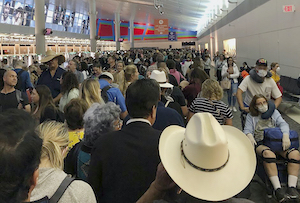
In this photo provided by Austin Boschen, people wait in line to go through the customs at Dallas Fort Worth International Airport in Grapevine, Texas, March 14. International travelers reported long lines at the customs at the airport as staff took extra precautions to guard against the new coronavirus, The Dallas Morning News reports. Boschen said it took him at least four hours to go through the customs. Photo: Austin Boschen via AP
“So there’s a verse in the Qur’an that I was thinking of. It’s in the 16th surah, the 92nd verse and it said, ‘Be not like her who unravels her yarn, disintegrating it into pieces, after she has spun it strongly.’ … That’s what’s happening to America as we speak. America was not built on a firm foundation. … How do you build a nation, killing the native people? How do you build a nation, bringing a whole people out of Africa to America to be made slaves? This is your foundation, so for them to lie to you, and make you think that America is a land of promise for you, and you believe it; no wonder Jesus said, ‘You shall know the truth and the truth will set you free,’” he added.
National emergency declaration: Too little too late?
President Trump March 13 declared a national emergency, freeing $50 billion in federal resources to battle COVID-19, amid fears the disease could place an almost impossible burden on hospitals and national medical and healthcare infrastructure. The declaration makes available supplies, personnel and other support available; encourages every state to set up emergency operation centers effective immediately; and requires every hospital in the country “to activate its emergency preparedness plan.”
The Centers for Disease Control called for limiting gatherings to no more than 50 people. New Jersey announced a no travel order between 8 p.m. and 5 a.m. on March 16. Gov. Phil Murphy said the statewide curfew would be coupled with coordinated closures of New Jersey, New York and Connecticut casinos, bars, gyms and restaurants.
During a March 16 briefing of the White House group handling the coronavirus crisis, President Trump called for gatherings of no more than 10 people and finally admitted the pandemic was real.
A Business Insider article speaks of a leaked presentation from a webinar hosted by the American Hospital Association which shows one expert’s estimate that 96 million Americans could be infected, about 500,000 deaths were possible, and 4.8 million people could eventually need hospitalization.
Experts warn the U.S. is short on ICU beds and ventilators needed to treat the disease. Trying to prepare for the worst, hospitals were ramping up their capacity and setting priorities. One proposal would draw doctors out of retirement, others are canceling elective surgeries, and calling for setting up “Covid Cabanas” to treat suspected coronavirus cases, setting up tents outside main facilities, and more.
Dr. Irwin Redlener, director of the National Center for Disaster Preparedness at Columbia University, has been a persistent critic of the U.S. government’s response.
“We are so incredibly underprepared for a major onslaught to hospitals, which is basically now inevitable,” Dr. Redlener told Yahoo News. “We have to look at Italy and see what happened and I think we’re actually in worse shape. We don’t have enough hospital beds; we don’t have enough ICU beds. And by the way, even if we had the 100,000-plus ventilators that we actually need, we don’t have the staff to operate them.”
Much of the blame for the federal government’s anemic response, the slow ramp up of tests and other resources nationally and the almost blanket denial of Covid-19’s spread by federal officials has come to rest at the feet of President Trump. From the beginning, critics charge, he has downplayed the crisis, at one point calling it a “hoax,” blamed the pandemic on foreigners and Democrats, and shut down air travel from Europe to the U.S. in a futile effort to stem the proliferation of the disease.
Perhaps the biggest reason for the Trump administration’s failed response is because the National Security Council’s global pandemic team was disbanded by former national security adviser John Bolton. The Trump administration has not bothered to fill those vacancies, leaving gaping and troubling vulnerabilities in America’s global pandemic preparedness.
Furthermore, when President Trump released the administration’s 2021 budget in February, it contained proposed cuts that would reduce funding at the CDC by 16 percent and remove $3 billion for global health programs.
Critics inside and outside of the medical community lobbed withering critiques of Mr. Trump and the poor federal government response.
“(T)he World Health Organization officially declared Covid-19 (coronavirus) an international pandemic. And with conflicting information coming out of the White House and Trump’s administration, misinformation and confusion are spreading like wildfire,” MoveOn.org said in a recent statement. “…What we need the most in this moment of crisis is competent and honest leadership in the White House that prioritizes the lives and livelihoods of all of us … This crisis has exposed the Trump Administration’s incompetence and its underlying corruption. It’s dangerous and it may even cost lives. While we fight to protect our families and communities, we also have to call out the threats and demand that they do better.”
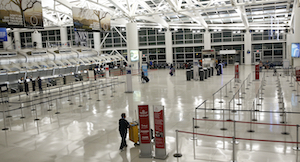
Few travelers are seen in a mostly empty flight check-in area at John F. Kennedy Airport’s Terminal 1, March 13, in New York. Recently, President Trump banned most foreign visitors coming to the United States from continental Europe to try to slow down the spread of the coronavirus. Photo: AP Photo/Kathy Willens
“Moments like these are when the role of a competent federal government—one that prioritizes the interest of people over profits—is so essential. While we focus on keeping our families and communities safe, we must also recognize that we deserve better as a country, and we must speak out when our leaders are putting corporate profits and their own reputations above the interests of public health,” said the progressive public policy advocacy group.
‘All this was avoidable’
Economist Dr. William Spriggs, former chair of the Department of Economics at Howard University, said much of what has happened could have been avoided.
“My own thoughts are evolving as things develop but there’s no reason for it to have this big an impact,” said Dr. Spriggs, who also serves as chief economist to the AFL-CIO. “There didn’t need to be a real recession. (They) waited until now to ask what workers do if they stay home. Recessions will separate people from their jobs.”
“We learned lesson during the Swine Flu epidemic in 2009 to not have any public events and close those places where the disease could flourish,” he said. “Ten years ago, we already knew this. There should have been a planned shutdown.”
Dr. Spriggs said what the public needs to remember is that the stock market is not the real economy.
“What you’re seeing in the stock market is a vote on Donald Trump. There’s too much uncertainty and huge unease,” he said. “For a long time, people said he’s incompetent but as long as the stock market is doing well and the economy is good, it’s fine. In a way, what we’re all experiencing is because of that. We’re paying for an incompetent and the whole world sees it.”
“Consumer spending will go down as people stay home because of the coronavirus. That will hit a number of industries particularly hard, such as the service industry, travel providers, live entertainment venues, movie theaters, and more. That in turn could lead to a domino effect, with turmoil in one industry spilling over to another,” commented WalletHub CEO Odysseas Papadimitriou. “For example, if a restaurant owner can no longer pay rent, the property owner might not be able to pay its loan, and the bank that made the loan might end up suffering as well.”
He praised a House bill passed March 13 aimed at providing relief for those struck by job losses and economic fallout from the coronavirus. “It is a good first step, if it gets through the Senate without significant changes or delays. It is a must that the final legislation includes free coronavirus testing for everyone and covers hospitalization costs for those affected, regardless of insurance coverage,” said Mr. Papadimitriou. “Regardless, it looks like we’ll need more legislation after this to further support the economy and affected workers.”
Rashad Robinson, of Color Of Change, an online racial justice organization, called for protecting Blacks from fallout associated with the crisis.
“Together, we will hold corporate and government decision-makers accountable and ensure that Black and marginalized communities are not denied the care, protection and support that all communities deserve,” he said March 13. These power holders have roles to play for everything from job and income support to protecting voting rights, taking care of prisoners and ensuring the marginalized communities aren’t left in the cold.
“After years of Republicans, Big Pharma and major corporations fighting against paid sick leave legislation and Medicare for all we are left with a crisis where disproportionately Black low wage workers are continuing to support the public without the health insurance or paid time off that would make us all safer,” asserted Mr. Robinson. “When we return to ‘normal,’ the normal for most people will be economic hell. That’s why we are immediately calling for a moratorium on evictions and utility shut-offs. For Black and poor communities that are being urged by the Center for Disease Control to stay home from work as much as possible, following health instructions shouldn’t mean added financial hardship.”
He also warned Black voters should not be denied their essential right in midst of the Covid-19 pandemic. “Now with coronavirus, existing voter disenfranchisement only exacerbates both the health risks and the lack of access for Black voters. States with upcoming primary elections should actively consider providing expanded ballot access on an emergency basis for this election and in a permanent, ongoing way for future elections. Any restrictions on travel or public gatherings must include provisions or exceptions that will ensure that voters, particularly oft-targeted Black voters, voters reliant on public transit, and other marginalized voters, are not disenfranchised,” he said.
“This epidemic also lands at a critical time for the launch of the 2020 Census. We must ensure that our national response does not jeopardize a full and accurate count of all populations and neighborhoods. Black people are among the most undercounted populations in the census and an undercount will lead to communities not getting the funding and representation they need or deserve for the next 10 years,” Mr. Robinson added.
“We are deeply concerned about the health, safety, and dignity of disproportionately Black incarcerated men and women as officials respond to this outbreak. While prison populations are quarantined from the general public, they are at high risk for Covid-19 outbreaks as they are kept in close quarters with inadequate food, water, and health care. Yet the nation’s jails and prisons have reportedly little access to coronavirus tests and in some cases, no soap, despite the inevitable spread of the epidemic in a captive population. Federal and state officials must ensure that testing and treatment for Covid-19 is available as needed in all jails and prisons,” he said.
“Concern for this population is only exacerbated by the fact that large percentages of the American prison population are incarcerated without trial, presumed innocent, but held because they are too impoverished to pay bail. There is no need for these people to be unjustly exposed to sub-par sanitary conditions in the midst of a pandemic, simply because they are poor and disproportionately Black. Similarly, state and local officials should also use all available powers to immediately release incarcerated people who are particularly vulnerable to illness, such as the elderly and pregnant women, so they can move to lower risk environments. And anyone who tests positive for Covid-19 inside a jail or prison should be released and moved to receive adequate care in a hospital.”
“They must also eliminate requirements that force incarcerated people to perform jobs that put them at risk for contracting the virus and institute a minimum wage for incarcerated workers who are providing vital services during this crisis. In New York state, prisoners are being forced to manufacture hand sanitizer, that they are banned from using, while being paid only pennies-per-hour in a cruel and ironic extension of American slavery. Finally, we must be vigilant against any attempts to abuse or misuse any public health quarantine measures to criminalize Black and brown communities,” Mr. Robinson said.
Unprecedented uncertainty in U.S.
Indiana University Professor Dr. Edward Hirt told The Final Call the psychological implications of the novel coronavirus pandemic are immense and potentially dire, ranging from acute individual anxiety about possible symptoms and the necessity for social distancing to communitywide panic-buying of food, health care products and other staples of daily life as well as severe trauma caused when a loved one becomes ill or dies.
“This is unprecedented in terms of evoking uncertainty,” he said. “There’s definitely been a denial and forthrightness about the disease and its spread. Even if we’ve known about it, it’s though it was ‘over there.’ Things have just accelerated in an enormously quick time. Now we have to be vigilant about everything such as touching doorknobs and being close to people, isolation time and how long is the quarantine. It’s just craziness.”
Dr. Hirt, who has authored over 75 publications in peer-reviewed journals and has recently written a book titled “Self-Regulation and Ego Control,” thinks the shock will wear off and “then there’ll be panic.”
“The reality of this is sinking in. We have a little bit of time before people get despondent,” he predicted. “A lot of people are paranoid. People are already wondering how much longer they will be personally affected and what this all means. The vast majority are looking for reassurance from the administration.”
This period of downtime and social isolation could allow people to spend time outdoors, walk the dog, catch up on tasks and activities and reconnect with family, said Dr. Hirt, who has taught at IU since 1991.
“You should be thinking about other activities, just accept it and not fight,” he advised. “We’ve got to make the best of it, keep up with the news. I think people can switch to think beyond themselves.”
That acceptance comes as Broadway in New York, Disneyland and Disney World in Florida and the U.S. Capitol and the U.S. Supreme Court are closed. The travel industry has taken a beating on the Dow Jones stock exchange, with some cruise ships coming from abroad temporarily converted into quarantine holding facilities house infected passengers offshore. Meanwhile, air travel has dropped off precipitously.
Seeking certainty in an unsure world?
For Atlanta resident Shanice Bennerson, the outbreak and spread of the COVID-19 virus in the U.S. and the decision by the World Health Organization to declare the outbreak a global pandemic left her shaken.
“I am proceeding with caution because I am asthmatic and have no insurance,” said Ms. Bennerson, a Millennial whose regular job is in educational research. She also works part-time at Jeni’s Splendid Ice Creams in Alpharetta, Ga.
“Fulton County schools, with the highest number of students in the area at 450,000, is out and has switched to online classes,” she noted. “Dekalb County schools is extending spring break. Everything is in shambles. Grocery stores are crazy, markets are crazy, but a lot of people aren’t taking it seriously. I’ve been following what’s been going on in Italy. We’re only really two weeks in as the numbers started low and took off. This public health crisis is exposing the underbelly of classes here in a way that I didn’t expect at all. Everyone not wealthy in this country is about to be screwed.”
A South Asian student of an Ivy League school, who’s working on a Master of Fine Arts degree, spoke of the difficulty he’s experiencing trying to understand, anticipate and navigate the public health crisis. He and his fellow classmates were informed by email that there was a presumptive case of someone at the school with coronavirus which necessitated taking precautions initially, then taking classes online.
The student, who is seeking asylum and fearful retaliation, requested anonymity to speak freely. “What happens if I contract the virus? Who will take care of me? Who will feed me? Where do I quarantine myself and how? I have been here for a few years and have people who are like family but not family,” he said.
“I am employed by the university, work 20 hours a week and live check-to-check. My department is still paying me but after six months, what will I do? There’s a range of different people being affected and there’s a great deal of uncertainly for me and a lot of people.”
“It’s hugely polarizing. Rich, young White kids are partying and can go to the clinic and pay $1,300 for the test, while poor people are dependent on federal government decisions,” he said. “The amount of money Trump has spent propping up the stock market—$1.5 trillion—could pay off the student loan debt. This has proven to be socialism for the rich and not for the poor.”
Virus spreads amid failed federal response
As of March 15, the coronavirus pandemic, which originated in Wuhan, China, had infected 142,539 people around the world and killed 5,200 as the disease has spread to more than 100 different countries. Most of the deaths have been seniors and the elderly.
In the United States, there were 49 states with more than 5,200 confirmed cases. But public health officials, epidemiologists and other medical experts warn that there are likely far more cases that medical professionals aren’t aware of because of the scarcity of available coronavirus testing kits from the Centers for Disease Control and Prevention.
Part of the problem is that while tests kits from the WHO are widely available, the Trump administration wants to use test kits produced by American companies, a decision that has worsened an already difficult situation.
“There’s a shortage,” Dr. Howard Forman, a professor at the Yale School of Public Health and practicing radiologist at Yale New Haven Hospital, told Yahoo Finance’s “On the Move.”
“And it strikes at the heart of everything we’re doing right now that we cannot do the most simple thing, which is just to test people and find out whether they are positive or not,” he said.
Despite the first confirmed case of COVID-19 in the U.S. occurred on Jan. 19, testing has lagged across the country. U.S. public health labs have picked up some slack, but health officials warn that the current pace of testing is not nearly enough.
According to the Atlantic, researchers “have concluded that thousands of Americans may have already been infected by the beginning of (March).” Between January 18 and March 10, there have been 11,079 tests for COVID-19 in the U.S. In comparison, South Korea has conducted over 100,000 tests.
Dr. Anthony Fauci, director of the National Institute of Allergy and Infectious Diseases, told host Chuck Todd on March 15 on NBC’s “Meet the Press” that Americans “should be prepared that they’re going to have to hunker down significantly more than we as a country are doing” to fight the growing coronavirus outbreak.
While several European countries are on lockdown to mitigate the crisis, Dr. Fauci said America should implement closures, especially “in those areas that have community spread.”
“Everybody has to get involved in distancing themselves socially. If you are in an area where there’s clear community spread, you have to be much, much more intense about how you do that,” he added. The goal now is to blunt the curve of confirmed cases and attempt to keep the number of those infected low enough that America’s hospital system isn’t overwhelmed, he said.
When asked if U.S. officials should consider a 14-day national shutdown as much of Europe has done, Dr. Fauci said: “I would prefer as much as we possibly could. I think we should really be overly aggressive and get criticized for overreacting.”
“If you let the curve get up there, then the entire society is going to be hit,” Dr. Fauci asserted.
Of all the Trump administration senior officials, Dr. Fauci has been the person most willing to speak clearly and honestly, while owning up to the federal government’s failings.
There is still no specific timeline for the ramping up of testing and increasing capacity, but Dr. Fauci announced during a press availability that the first human test of a novel coronavirus vaccine could begin in a few weeks, ahead of schedule, although he added it still could take as long as a year or 18 months before its available to the public. CNN reported March 16 that the first dose of the vaccine was given to a study participant in Washington state.
(Final Call staff contributed to this report.)

